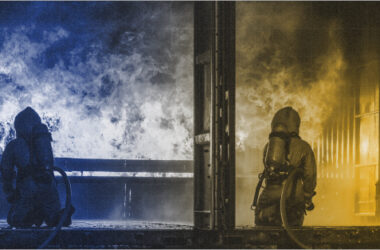Fire accidents may occur without any previous notice – a spark may turn years of hard work into ashes. In India, where factory, residential and commercial complexes tend to be densely spaced, the likelihood of fire losses is high. It is the reason why Fire Insurance coverage is considered not only a financial protection, but also a must-have risk management instrument for all property owners and companies.
But not every damage is caused by accidental fires. There are also instances when there can be losses caused by riots, strikes or other mischief and these are not covered by a standard Fire Insurance Policy. That is where the RSMD cover comes in as an essential supplement to your Fire Insurance coverage, which offers a financial cover against human-induced nuisance that can be equally devastating.
We will now dig further to find out the meaning of RSMD cover, what it entails, and why it is essential for robust financial protection.
RSMD Cover in a Fire Insurance Policy
Before we unpack the benefits, we need to decode the term. The acronym RSMD means Riot, Strike, and Malicious Damage. It is an optional add-on to a Standard Fire and Special Perils Policy ( SFSP ) to cover types of perils other than accidental fires or natural disasters.
The RSMD clause covers loss or damage to property which is directly caused by:
- Violent civil unrest or riots.
- Strikes or labour unrest.
- Criminal activities that lead to intentional damage to property.
Simply put, where standard Fire Insurance covers losses that arise due to an accidental or natural event (such as fire, lightning, or explosion), the RSMD cover compensates for losses that occur willfully or deliberately as a result of a riot, a protest or deliberate vandalism.
As an example, when a political riot breaks the glass window of a store or a machine of a factory is destroyed by protesting workers during a labor strike, the RSMD cover will compensate for the losses.
Scope of the RSMD Cover in a Fire Insurance Policy
To experience the full value of RSMD coverage, you should learn the meaning of each of the three integral components ( Riot, Strike, and Malicious Damage) and its role in protecting your property.
- Riot
Riot is an act of violent outburst by a group of individuals with a shared agenda that leads to property destruction. Even fortified buildings can become a victim of mob actions in such cases. The RSMD cover steps in to offset such damages.
As an illustration, when there is a massive protest or a political rally, shops, warehouses and vehicles can often become collateral damage. It may cost you a fortune to repair or replace such properties. But, the RSMD cover will make sure that you do not have to shoulder all the burden alone.
- Strike
A strike is normally a form of organized action by employees to complain to the employers, which sometimes leads to the work being temporarily suspended. As often seen, some strikes can lead to unrest in which property is damaged. In case machinery, factory premises or equipment is destroyed due to violent strike activities, the RSMD cover provides financial relief.
Strikes and demonstrations of workers are not something new in the industrial sector in India. In cases of businesses that are dependent on continuous operations, this cover is capable of separating temporary failure and a financial disaster.
- Malicious Damage
Malicious Damage is the intentional destruction done by a party or a group of people with a premeditated aim to destroy property. It is not attached to a particular cause ( as is the case with a riot or strike)- it might just be vandalism, vengeance, or a destructive act.
An example of this is when an individual maliciously damages the property of a company by smashing windows, lighting it on fire, or vandalizing the property. These losses are covered by RSMD cover, provided that they are not associated with war, terrorism or nuclear risks.
Functioning of the RSMD Cover in a Fire Insurance Policy
The Standard Fire and Special Perils Policy (SFSP) serves as the foundation of Fire Insurance in India. Introduced and regulated by the Insurance Regulatory and Development Authority of India (IRDAI), this policy protects against major perils like fire, lightning, storm, flood, explosion, and impact damage.
However, the standard SFSP policy doesn’t automatically cover losses from riots, strikes, or malicious acts. Policyholders will have to buy or renew the Fire Insurance Policy with the RSMD extension in order to cover these perils.
Here’s how the RSMD cover typically functions:
- Add-on Inclusion:RSMD is included as an extension clause under the SFSP..
- Premium Adjustment: This addition adds a small amount of premium but extends the coverage significantly. The cost will be determined by certain factors such as location, property type, and the amount of risk.
- Claim Process: When there is an RSMD related incident, the insurer will carry out a thorough investigation to establish the cause of the damage. After the loss or repair of the insured property is confirmed, the compensation is paid as per policy terms.
The RSMD clauses of most Indian policies are based on the Tariff Advisory Committee (TAC) guidelines, which maintain uniformity in standards across insurers.
Exclusions Under RSMD Cover
While RSMD coverage is comprehensive, it’s not limitless. Understanding its exclusions helps avoid unpleasant surprises during claim settlements.
Common exclusions under RSMD can include:
- War, civil war, or similar hostilities: Damage caused by warlike operations or invasion is not covered.
- Nuclear perils: Losses resulting from nuclear radiation or contamination are excluded.
- Terrorism: Acts of terrorism are excluded and require a separate Terrorism Risk Insurance cover.
- Theft during or after the incident: If goods are stolen during or following a riot, the theft portion is not covered under RSMD.
- Loss of market or consequential loss: Indirect losses, like loss of business or market value, aren’t covered.
Insurers do not cover such perils as they involve large-scale, unpredictable and catastrophic risks that need to be covered by special insurance policies.
RSMD vs. Other Add-On Covers in Fire Insurance : A Comparison
RSMD is not the only useful addition to Fire Insurance policies. To get a better idea of its role, we will take a look at how it is compared with other extensions.
A) RSMD vs. Earthquake Cover
An earthquake cover insures against natural movements of the ground that may result in destruction or collapse of property. In contrast to RSMD,which covers man-made acts of violence or vandalism, earthquake cover is simply for natural peril coverage.
B) RSMD vs. Terrorism Cover
A terrorism cover is a compensation cover that covers damages as a result of terrorism activities, which are not covered under RSMD. This is usually provided as an add-on cover since terrorism events may be associated with mass damage, and the Terrorism Risk Insurance Pool in India regulates this insurance product.
C) RSMD vs. Forest Fire Cover
Forest fire coverage insures properties along forested regions against fire spreading as a result of natural causes. RSMD, in turn, addresses the damages induced by humans.
Each add-on protects a particular type of risk – and to be completely covered, most businesses acquire a set of these covers based on their specific risk exposure.
Why is RSMD Cover Important for Businesses and Property Owners?
The social and political environment in one of the most dynamic and multi-cultural countries like India is not always predictable. Riots, strikes, or protests may occur out of the blue and their effects on property may be catastrophic.
A. For Businesses
- Operational continuity: A single act of vandalism during unrest may ruin valuable machines or inventory. RSMD cover guarantees fast recovery without crippling financial losses..
- Security of assets: whether you own a factory, a retail outlet or a warehouse, RSMD can be used to safeguard the physical assets against damage caused by either unrest or a malicious act.
- Peace of mind: Companies in politically active or industrial regions have greater risks. The RSMD cover will provide peace of mind knowing that, if there is a mob attack during a strike, your investment remains protected.
B.For Homeowners
Homeowners are not immune to such perils. Residential buildings can also be damaged during riots or protests. RSMD cover ensures your home and valuables remain financially protected even in such unpredictable situations.
Case Example
In 2020, during widespread protests across several Indian cities, multiple commercial establishments reported damages from vandalism and looting. Businesses with RSMD cover were able to recover a large portion of their losses through insurance, while those without it had to absorb the financial hit themselves.
This highlights why RSMD coverage isn’t just an option — it’s a strategic necessity in today’s uncertain environment.
How to Choose the Right Fire Insurance Policy with RSMD Cover
The process of choosing the appropriate Fire Insurance Policy that includes RSMD cover cannot be completed by simply comparing the prices of different policies. It is all about the knowledge of your risk landscape and ensuring comprehensive protection.
Here’s how to make a smart choice:
- Evaluate your risk exposure:
Take into consideration where your property is located. Is it close to industrial locations, political hotspots or cities likely to experience protests? The greater the exposure, the more important RSMD cover is. - Assess your property type:
Residential properties are usually less susceptible to damages than commercial properties, factories, and warehouses. Also make sure that your sum insured covers the replacement cost in full. - Consult with your insurance provider or broker:
Professionals may assist you in tailoring your fire insurance policy with appropriate add-ons, such as RSMD, earthquake, or terrorism insurance coverage. - Carefully Review the policy wording:
Get familiar with the inclusions, exclusions, and claim procedures as part of the RSMD clause to avoid confusion during claims. - Don’t skip renewal or updates:
Fire Insurance policies are contracts that are renewed on an annual basis. Always renew on time and renew your insurance coverage when your business expands or your assets become more valuable.
Final Thoughts:
In today’s world marked by high industrialization and socio-political activity, property risks are not limited to accidents or natural disasters alone. Damages caused by humans, such as riots, strikes, or vandalism, may bring everything to a halt overnight, in terms of finance.
When you make sure that you have RSMD in your policy, you are protecting your business or home against a wide range of real-world threats.
That is why, when you are about to purchase your next Fire Insurance Policy, you should ask yourself: “Does this policy cover me against riot, strike and malicious damage?” If the answer is a ‘no’- it is time to include the RSMD clause in your policy. This is because, resilience is not merely about being able to survive the flames. Rather, it’s about being ready for the chaos that can ignite them.








